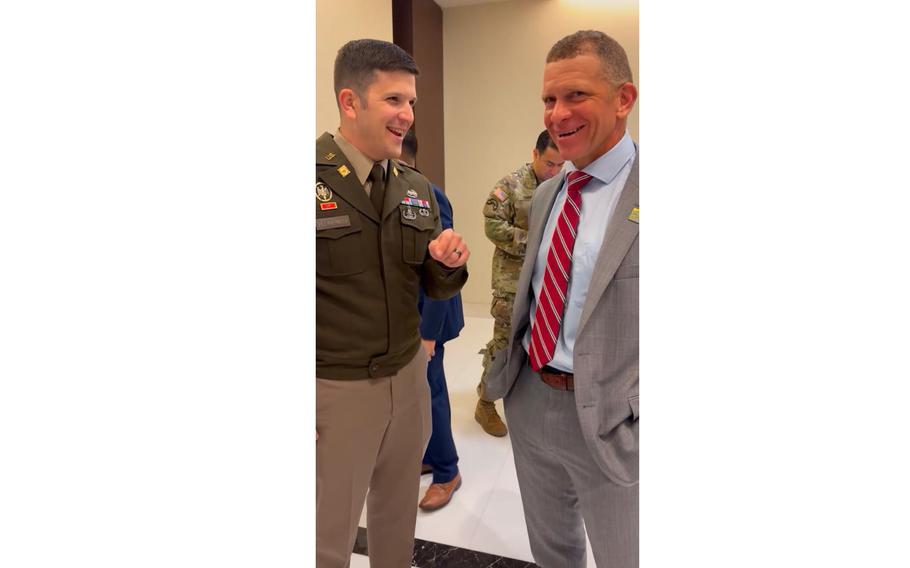
Capt. Michael Villahermosa, left, and Army Emergency Relief CEO Tony Grinston, the former 16th sergeant major of the Army, chat Oct. 15, 2024, at the Association of the United States Army’s annual event in Washington. (Amanda Kim Stairrett/Army Emergency Relief)
Soldiers in need of financial help to travel during a family emergency can receive money from an Army-focused nonprofit relief fund without the added stress of repaying a loan, the organization announced Monday.
Emergency travel loans previously required a soldier to repay half the amount borrowed. Making this change to be a full grant has been a focus for Tony Grinston, who retired as sergeant major of the Army in August 2023 and soon after became CEO of Army Emergency Relief, the nonprofit that administers the grants.
“I know firsthand the difficulties of losing a parent while serving away from home and the expenses that come along with it,” Grinston said Monday. “Rather than a 50% zero-interest loan, 50% grant, it is essential soldiers can attend funerals or visit hospitals with immediate family without the financial burden, especially when serving overseas. This change to full grants honors their sacrifices for protecting this great country during difficult moments.”
Army Emergency Relief’s mission is to relieve financial distress faced by soldiers and service families through interest-free loans, grants and scholarships for a variety of reasons, such as health care that falls outside of military health insurance, funeral expenses, home repair or spouse licensing and recertification. It can also help soldiers obtain child car seats, clothing and child care. All assistance is considered on an individual basis and 5.5% of service members received assistance last year.
The emergency travel program is widely used among soldiers. As of the end of November, 4,327 soldiers have received nearly $4.6 million in assistance for emergency travel, according to the nonprofit. Soldiers ranked specialist to sergeant first class are most represented in the program.
The amount provided each soldier can vary greatly, Grinston said earlier this year. For example, airfare to get a soldier, spouse and children back to the U.S. from Germany following a death in the family is far more expensive but just as important as helping a single soldier drive home in a similar situation.
Beginning Jan. 1, the amount of grant money provided for round-trip airfare will be capped at $2,000 per request for domestic travel and $4,000 for flights outside the continental U.S., according to AER. If there are costs beyond the cap, including hotel and meals, it could be provided to the family in an interest-free loan. Based on the family’s financial situation, that loan could also become a grant, the nonprofit said.
Grinston began working in March to find a way to change this partial loan to a full grant after touring the globe to meet with soldiers and hear what they thought about Army Emergency Relief.
Last year, AER received more than $2.2 million in donations. Soldiers received more than $38.6 million in loans, $7.8 million in grants and the organization provided $5.2 million in scholarships.